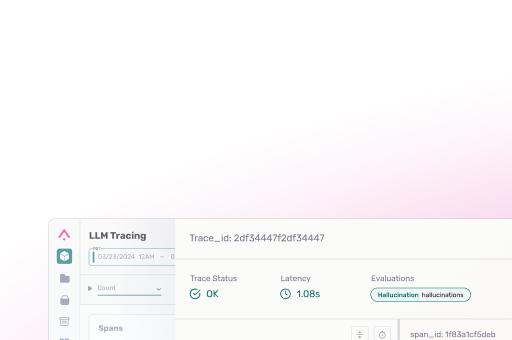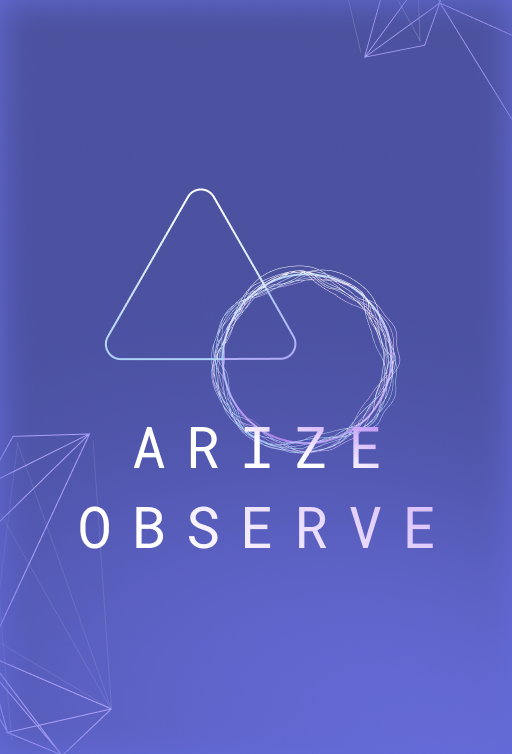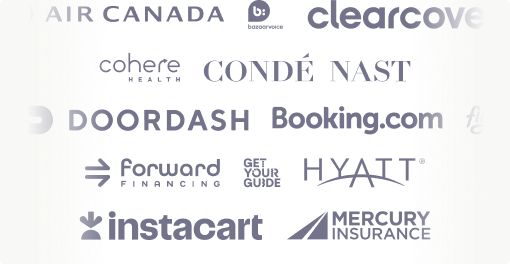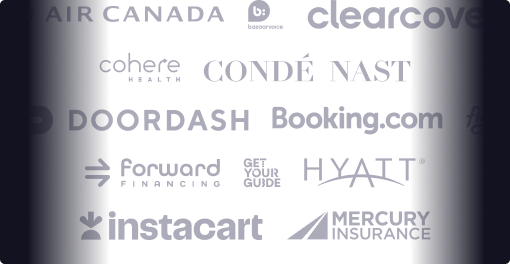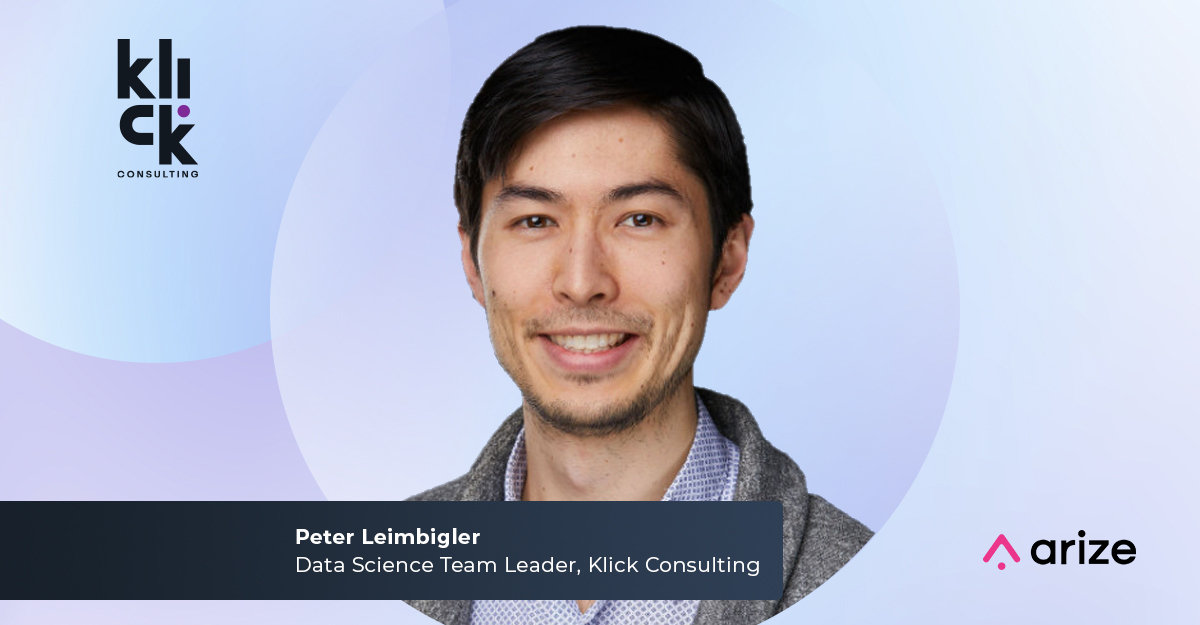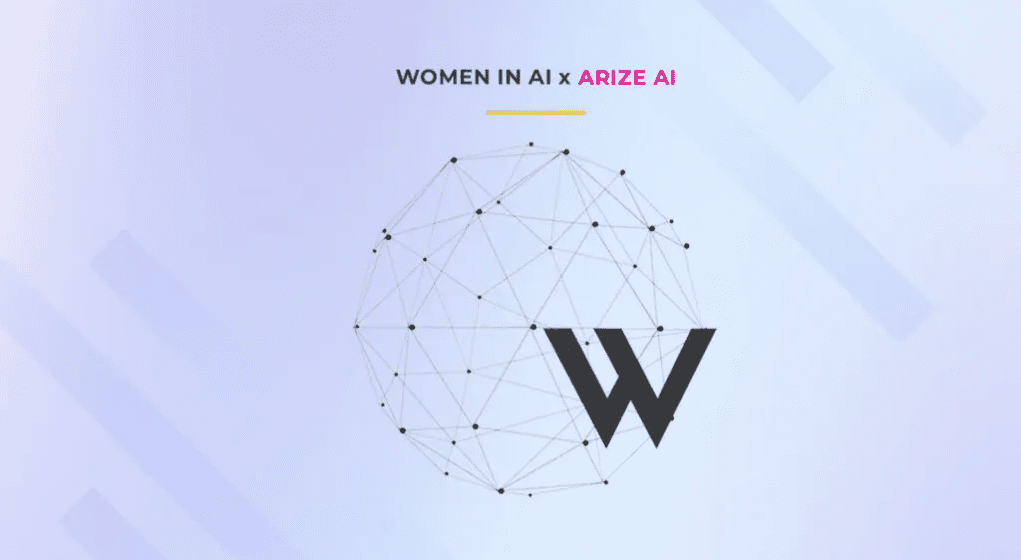
Eight Takeaways From Our Event With Women of AI
Recently, Arize AI hosted an event with the Canada chapter of Women of AI, a global nonprofit dedicated to increasing female representation and participation in the world of AI and machine learning (ML). Moderated by Arize’s Amber Roberts, speakers included Arize Founding Engineers Tsion Behailu and Manisha Sharma, Clearsum’s Lead AI Scientist Elhman Kheradmand, and Unity Software’s Lead Technical Recruiter Dominique Drouin. In front of a global audience with attendees watching as far away as India and South Africa, panelists discussed their personal journeys and how they both overcame challenges in the space and found their voices in a systemically underrepresented industry. They also provided helpful advice for women aspiring to pursue careers in AI.
Miss the event? Here are eight top takeaways from the conversation.
There Are Many Possible Paths Into the Fields of AI and Machine Learning
When it came time for our five panelists to land on college majors and future career paths, the field of AI and machine learning didn’t really exist in its current form. Our panelists talk about their diverse journeys into the worlds of AI and ML, from software engineering and astronomy to postdoc research and recruiting.
“When I was studying in Montreal, I saw that AI had a great application in my projects, so I took some courses and started teaching myself. After finishing my PhD, I decided I wanted to pursue the application of AI for social good in my research and as a career,” says Elham Kheradmand. “Two years ago, I joined a professor’s group and started my postdoc, conducting research development of ML models in sustainable finance and climate-related topics. I’m also a Lead AI Scientist at Clearsum, a consulting company helping others with climate resilience.”
For Dominique Drouin, it wasn’t love at first sight. “I started as a tech recruiter and was recruiting data scientists for the financial industry. I didn’t fall in love with it right away, but I discovered that I love people and the recruitment process. So when I was offered the chance to build the Operate Solutions team here at Unity in Montreal, I jumped on it. The people that I’ve had the chance to meet and hire inspire me to discover the amazing talent that’s out there for AI, ML, and data science.”
Tsion Behailu and Manisha Sharma studied computer science and cognitive science, respectively, at UC Berkeley, where they both met Arize co-founder Aparna Dhinakaran. After graduating, Behailu pursued software engineering at Google before Dhinakaran convinced her to join Arize.
“I knew it would be a great opportunity to grow in something more theoretical and also enhance my technical skills. Arize was definitely a crash course for me in AI and ML. I still have so much to learn, but I learned as I went along,” Behailu says. For Sharma, “My first introduction to AI was in the context of the real world, from the perspective of its social impact. I’ve been at Arize for two-and-a-half years now and still feel like a novice. For me, the journey of having an introduction in college and then being able to work on it day-to-day and build products around it has been really great.”
With formal training in astrophysics, Amber Roberts has been an ML Product Manager at Splunk and Head of AI and Insight Data Science before joining Arize. “Even if you don’t know what you want at first, having different jobs and projects helps us learn what we do and don’t like and the path that feels right to pursue,” she says.
Minimum Risk, Maximum Reward: Making the Leap Into AI Is a Good Bet
With any new industry, there’s always a level of risk and uncertainty, but as Behailu put it, “This is a hot field.” According to Kheradmand, there’s always a question of whether it’s a good fit, if there’s career longevity, and the reality that you might spend time on a project that doesn’t get great results. But if you’re passionate about the subject matter, the leap of faith can be worth it.
According to Drouin, “It’s impossible to know from the beginning whether you’re going to have success, and those first big steps to get into a new industry can feel like a big risk. But often you can look back on it and see that it was just one part of your journey.”
Sharma has a very measured perspective. “Joining Arize with no background in AI was a risk, but it was a very calculated risk,” she says. “For me, having friends at the company and people I felt safe with made the idea of tackling this very technical domain easier.” And Behailu’s experience actually taught her to take on bigger risks in tech. “There’s this pressure sometimes that, as women, you have to be perfect before you put yourself forward for a role. I’ve seen so many people with the same amount of talent, but maybe they just sell themselves better because they’re their biggest advocate. It’s taught me that I don’t have to already be this perfect thing to go for a bigger and scarier role.”
Knowing When To Transition Is About Asking Yourself Big Life Questions
Behailu shares her experience of leaving Google, where she had worked for five years, to take a chance on a startup as a Founding Engineer. She talks in-depth about the process that helped her make such a big decision in this must-read article for anyone looking to make a change. “It’s such a personal decision and different for everyone. I took a lot of time to think about where I’m trying to be at this stage in life, what experiences I want to have, and the kind of growth I’m looking for,” she says. “I wrote down my values and my goals and weighed all the pros and cons so that when Arize presented this opportunity to me, I’d already mulled over the effects of leaving the comforts of a big company. It just felt right and I knew I wasn’t going to regret it.”
Passion and Preparation Can Help You Land a Job in AI and ML
Our panelists offer up great advice about what it takes to prepare for your first job in ML or AI. First, you need to find a way to get the skills, experience, and firsthand knowledge required for the role. Drouin says to identify what’s missing on your resume and find ways to get that experience. “Statistics show that women apply less frequently to roles where they don’t check 100% of the requirement boxes, while most men will apply even if they only check 60% of them. And this is unfortunate,” she says. “I recommend massaging your resume and looking for transferable skills that might address those requirements.”
If you don’t have the required experience, Roberts says you should try to show initiative through personal projects that demonstrate new skills you’ve learned. And Sharma feels strongly about learning to speak the language, especially if the language is very technical. She also talks at length about essential elements for aspiring founding engineers in this article.
In terms of resources, Drouin suggests searching LinkedIn profiles for job types you’re interested in and then studying from a startup or from open sources. For anyone interested in transitioning into the ML space, Roberts recommends trying a free product like Arize to gain a basic understanding of what to do when you put a model into production. “A lot of employers in this space are looking for people who know how to properly handle putting a model into production,” she says. Roberts also thinks Coursera has some good courses for machine learning certifications. Kheradmand touts organizations like AI Launch Lab in Montreal, an educational nonprofit that gives you the chance to work on a real AI project over the course of several weeks and consult with mentors, like herself, who will help you along the way.
And finally, it often comes back to networking. “Building relationships can make a huge difference in your career journey, no matter what you decide to do,” says Drouin. “Schoolmates, internship managers, current colleagues, mentors—they’re all important and can be game changers in your career path. They can help you grow as a person and help you grow your future.” She adds, “When people ask me for recommendations on where to get experience, seek mentorship, or expand their network, it shows they’re willing to take the steps instead of just pushing their resume to someone on LinkedIn.”
Seek Empowerment from Women Supporting Women in AI
Being a woman in AI, or tech in general, isn’t always an easy path, but Kheradmand encourages more women to get involved to help narrow the gender gap in AI. “It’s a fascinating field with a long future and a lot of roles to play. There are also great women in AI already who can offer their support,” she says. Additionally, Sharma shares some of the wisdom she’s learned along the way. “Often when you’re underrepresented, you feel that you have to prove yourself to the majority, and there’s a very real weight on your shoulders to break the bias. What I realized over time is that it’s not actually my responsibility. I don’t have to prove to everybody that women are just as talented in this field. Earlier in my career, I felt like I’d be failing my entire gender unless I was exceptional. Now I don’t take every little mistake so seriously.”
Pay Equity Is Still Elusive; Here’s What To Expect
As a recruiter, Drouin shares her insight. “It’s a work in progress, but I think issues of pay equity are getting better. Companies really have to take initiative because there’s not a lot of room for mistakes these days. Pay should reflect the market, geographic location, and internal parity. These should all be addressed up front in job offers and with recruitment and HR, and if not, adjustments need to be made after hiring. Your direct manager should be able to tell you why someone is paid more than you. If their justification doesn’t make sense to you, then I would say to seek parity elsewhere,” she says.
Process and People Are Two Key Differences Between Big Tech and Startups
Anyone who’s ever worked at both startups and large companies knows there’s a world of differences. But Behailu and Sharma zero in on two of the biggest. “In the first year of a company, it’s almost always the lack of processes. In some ways, it’s great because you can move quickly, whereas, at somewhere like Google, the same thing would take six months. As the startup grows, more processes are put in place, but you still have to think through whether a certain process is right at different stages in the company’s growth,” says Behailu. Sharma adds, “At startups, every decision has the potential to make a huge impact, and because of that, it’s important to work with people you trust. At a big company, there are so many teams, departments, and levels and you can move around. But in a small company, the tight-knit team of people you’re making decisions with becomes critical.”
Companies Are Working Towards Better Recruiting & Talent Retention
Retaining talent at a time when a lot of people are looking for change isn’t easy. From Drouin’s perspective as a recruiting expert, talent retention starts with aligning goals and values and then fostering growth from within. “First off, it’s important for employees to make sure their goals and values are aligned with the job and the company. And then companies need to have a retention plan: keeping track of employees’ career evolution, performance tracking, and understanding their interests and asks. It’s also important for companies to be mindful that employees’ interests may evolve over time, and that’s where supportive managers are key. Space for internal mobility is also a big thing—different teams, departments, and regions that employees can apply to is huge for keeping talent,” she says.
